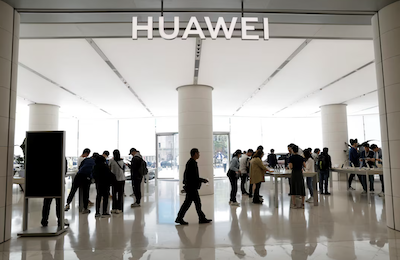The Trump Administration is looking at axing a key US trade benefit to other countries known as the “de minimis” exemption on import tariffs.
Such a move could actually win bipartisan support in the US, as lawmakers in both major parties believe it has been abused by China and many blame it for worsening the fentanyl drug crisis.
Indeed, Trump’s predecessor Joe Biden, in one of his last acts as president, proposed curbing the “loophole” on Friday. Trump indicated on his first day in office that de minimis was unlikely to survive for long, at least in its current state.
ALSO SEE: SoftBank, UAE’s MGX Join $500bn Data Centre Deal With OpenAI
Over a billion packages in 2023
‘De minimis’ is a legal term referring to matters of little importance. It is the name for the US waiver of standard customs procedures and tariffs on imported items worth less than $800 that are shipped to citizens.
The current rule is one of the most generous trade exemptions in the world. By contrast, for example, the EU de minimis threshold is 150 euros ($156).
The US has used de minimis since 1938 to reduce administrative burdens. During Barack Obama’s presidency, Congress quadrupled the waiver from $200, facilitating an explosion in the number of exempted packages entering the country.
Shipments claiming de minimis have soared more than 600% over the past decade to over 1 billion items in fiscal 2023, according to Customs and Border Protection data.
Critics of de minimis also say it lets companies evade tariffs on Chinese goods and customs inspections under a law banning products made with forced labour.
Worsening the fentanyl crisis
The two most contentious aspects of the law are that it fuels the huge trade imbalances the US has with China and other trading partners, and it opens the door to parcels of the synthetic opioid fentanyl.
Many officials say the law has exacerbated the country’s worst drug crisis – and fuelled the fentanyl epidemic that killed nearly 75,000 people across the country in 2023.
Reuters reporters said they found last year they could easily import the core precursors for at least 3 million fentanyl tablets – with a potential street value of $3 million – at a cost of $3,607.18. The shippers successfully mislabelled the packages as, for instance, electronics.
Legitimate products too are controversial as Trump ramps up his rhetoric against China, with which the US has its largest bilateral trade deficit, at $279 billion as of 2023.

Big beneficiaries of de minimis include online retailers that ship goods mainly from China, such as Shein, PDD Holdings-owned Temu and Alibaba’s AliExpress.
Their growth prompted US rival Amazon to start its own discount service, Haul, allowing marketplace merchants to ship $5 accessories and other items directly from China using de minimis.
Shein declined to comment on possible changes to US de minimis policy. In 2023 the company called for de minimis reform “to create a level, transparent playing field – where the rules are applied evenly and equally”. Temu, AliExpress and Amazon did not respond to requests for comment.
Law being reviewed in US and EU
On Monday, the Trump administration published an “America First Trade Policy” memo ordering the Treasury, Commerce and Homeland Security departments and the US Trade Representative to assess the reduction in revenues and the risks from importing “counterfeit products and contraband drugs” under de minimis.
Trump instructed the agencies to “recommend modifications as warranted to protect both the revenue of the United States and the public health by preventing unlawful importations”, without specifying what changes could be considered.
China has said it is willing to maintain communication with the US to “properly handle differences and expand mutually beneficial cooperation”, and seeks stable and sustainable ties with Washington.
Outside the US, the EU is discussing changing the bloc’s de minimis rules, while Mexico recently effectively scrapped its de minimis threshold for packages arriving from countries other than Canada and the US.
Impact on China clothing, consumer exports
China exported $240 billion in direct-to-consumer goods benefiting from de minimis worldwide last year, accounting for 7% of its overseas sales and contributing 1.3% of gross domestic product, according to Nomura estimates.
The brokerage forecasts that eliminating the US threshold would slow Chinese export growth by 1.3 percentage points and GDP growth by 0.2 points, with a significantly bigger hit if Europe and Southeast Asia also cut their minimum requirements for customs duties.
China’s most exposed sectors include apparel, which makes up 35% of China’s direct-to-consumer exports by value, consumer electronics at 22%, home decor at 17% and beauty products at 7%, Nomura reckons.
- Reuters with additional editing by Jim Pollard
ALSO SEE:
US to Curb Cheap China Parcels: Temu, Shein Face Big Hit
Call for US Product Safety Probe of Items Sold on Shein, Temu
PDD Stock Plunges 28% as Revenue Hit by China Slowdown
Hundreds of Sellers Protest in China Over Temu’s Penalty Policy
EU Plans Duties On Cheap Goods From Temu, Shein, AliExpress: FT
China’s Shein Files For Potential London IPO as US Plans Stall
Temu, Shein Face Tough Online Content Rules As EU Users Soar
US Lawsuit Says Temu Shopping App Has ‘Hidden Spyware’ – AT
US Sanctions 8 Chinese Drug Companies for Fentanyl Trade
























